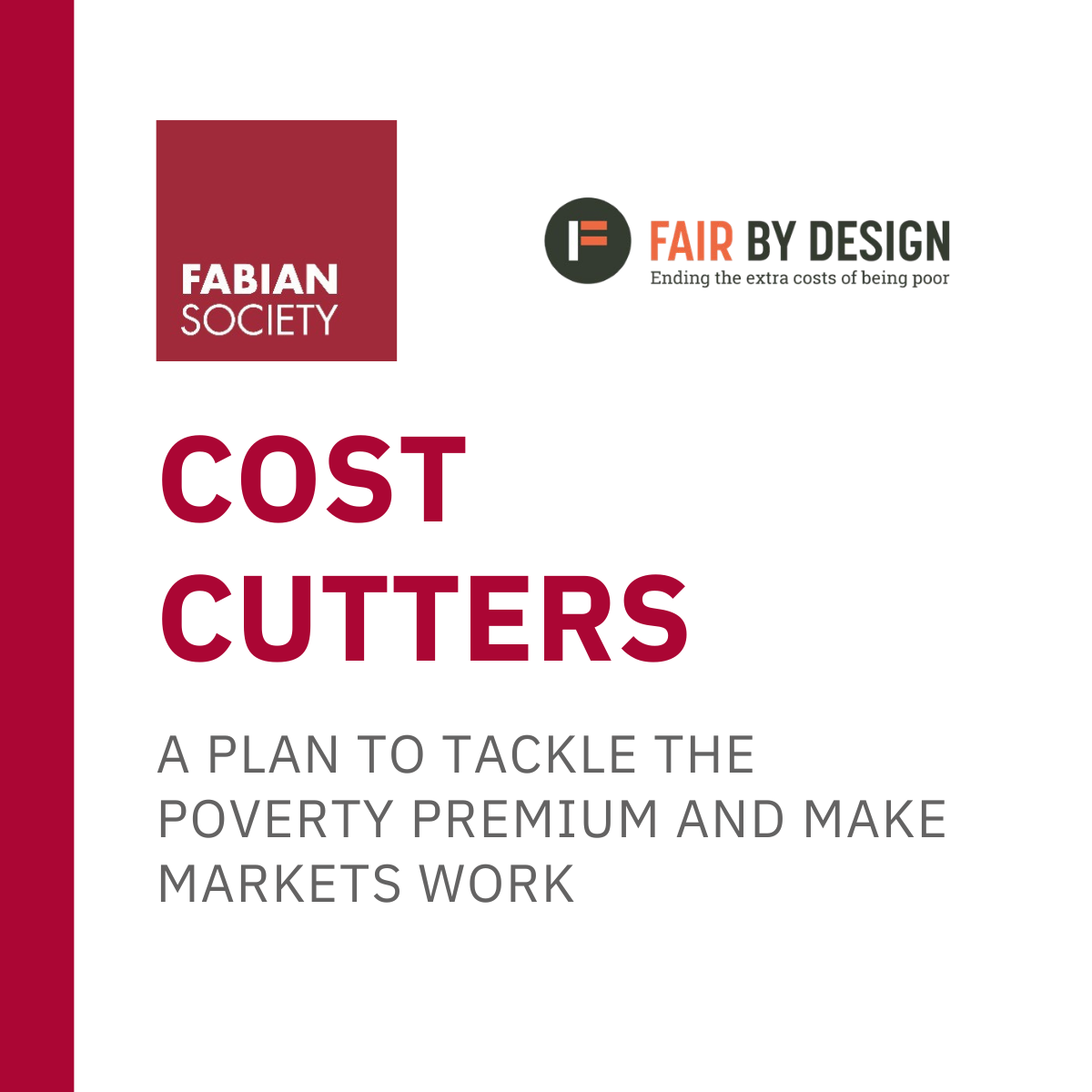The ‘poverty premium’ cost UK poor households £444 more for essentials per year in 2022 (latest figures).
The government and regulators pass the buck over who is responsible for making markets work for everyone.
The government and regulators should take immediate action to cut costs alongside long-term reform that put consumer voices at the heart of regulators’ decisions.
The market for essential goods and services cost poor households an additional £444 a year, a new report from the Fabian Society has found.
Price rises since the October 2022 mini budget have made the cost of living crisis a catastrophe for poor households facing the ‘poverty premium’.
The report, in partnership with Fair By Design, shows how low income families pay more for broadband, energy, financial services, food and water.
Each of these separately regulated markets has failed poor households in different but connected ways. Neither government nor regulators have listened to those in poverty whose particular needs have been ignored.
Regulators rely on consumer ‘choice’ and individual responsibility for finding a good deal, which leaves poor households paying more than they should.
The government and regulators often pass the buck over crucial decisions that affect poor households, because neither is clear on their responsibility.
The report recommends that the next government reforms markets for essentials, so families can keep more of their own money. The report recommends an immediate and comprehensive ‘Cost Cutting Plan’ which would save low-income families an estimated £220 per year, without the need for any additional public expenditure. And the next government should work towards implementing a new energy social tariff, which would save eligible families around £340 per year.
The next government must act to ensure consumer voices are heard, the report recommends. The government should appoint consumer representatives to make up a third of the board of every regulator of essential markets. The government should also require regulators to consult with a new consumer committee when setting their direction and major policy interventions.
Report Author, Fabian Society Research Manager Ben Cooper said:
“The cost of living crisis is not over, with prices still rising and families struggling to recover from the past two years.
“Low income families are forced to pay £444 extra for essential goods and services because they are poor. This ‘poverty premium’ is proof that markets are designed to treat some families differently and unfairly.
“In this report, we set out the need for action to save low income families hundreds of pounds a year and to reshape markets so they work for everyone. It sets out how both the government and regulators need to cut costs for families and put money back into people’s pockets.“
Martin Coppack, Director of Fair By Design, said:
“It costs more to be poor. Markets for essential services are failing low-income consumers every day. Worse deals are being offered on everything, from insurance to energy, just because you’re poor.
“It’s time for Government and regulators to take responsibility and create markets that work for everyone, not just the healthy and wealthy.
“Taking action on the poverty premium will put more money back in the pockets of low-income consumers and put millions back into local economies.”
Richard Kramer, Chief Executive of the national disability charity Sense, said:
“This is a welcome and timely report that highlights an unfair system that leaves disabled families paying over the odds for essential bills like energy.
“Disabled people are more likely to use pre-payment meters, less likely to use direct debits, and can struggle to change providers due to difficulties contacting them. All of these things pave the way for higher energy bills; this is totally unfair given disabled people have already been hit disproportionately hard by the ongoing cost-of-living crisis.
“The recommendations in this report, including introducing a social energy tariff, could level the financial playing field, providing vital assistance to disabled families. We hope the government will read this report carefully and take its recommendations seriously.”
Joanna Elson CBE, Chief Executive of Independent Age, said:
“We welcome the findings of this report which show how the poverty premium unfairly impacts lower income households. It’s not right that people living in poverty, including those in later life, who are often struggling to even afford basic necessities such as food and energy can face higher essential costs, for example if they cannot pay for services or utilities in one go. These unfair costs need to be addressed. It’s not acceptable that in the sixth richest country in the world, older people without enough money to live on are going to bed cold and hungry or are washing less to save on water.
“If implemented, the recommendations in this report would effectively help older people who are being forced to cut back on essentials. Our own research also found that reforms to social tariffs in essential markets, such as water and energy, alongside general awareness raising of discounts and tariffs, would be particularly impactful at ensuring older people living on a low income get the financial support they need. It’s vital that the current and future UK Governments ensure that everyone has long-term financial security.”
Peter Smith, Director of Policy and Advocacy at National Energy Action (NEA) said:
“For too long, households on the lowest incomes have been paying a dear premium for essentials like energy. This welcome report offers credible ways to reverse this worrying trend and provide targeted support where it is needed most. Given the ongoing impact of the energy crisis, a social tariff, accompanied by sustained support for energy, debt and income advice is essential now but will also grow in importance as we continue the path towards net zero”.
– Ends –
Notes
- Contact: Emma Burnell, Media Consultant, Fabian Society [email protected] or 07851 941111
- Cost Cutters: A plan to tackle the poverty premium and make markets work for low-income families is published by the Fabian Society. It was edited by Kate Murray and Iggy Wood.
- Regional data is available on request.
- The average cost of the poverty premium was calculated using 2022 data from the University of Bristol’s Personal Finance Research Centre, published in 2023. This data was used to estimate the total cost of the poverty premium and the total number of low income families.
- Interviews with Ben Cooper, the report author, and Caroline Cawley, a person with lived experience of the poverty premium, are available upon request.
- The Fabian Society is Britain’s oldest political think tank. Founded in 1884, the society is at the forefront of developing political ideas and public policy on the left. The society is alone among think tanks in being a democratically-constituted membership organisation, with around 7,000 members. It is constitutionally affiliated to the Labour party.
- Fair By Design is dedicated to reshaping essential services such as energy, credit, insurance and payments so that they don’t cost more if you’re poor – also known as the poverty premium. Fair By Design works with regulators, Government, Parliament and industry to eliminate the poverty premium. Fair By Design is managed by the Barrow Cadbury Trust on behalf of a group of foundations.





